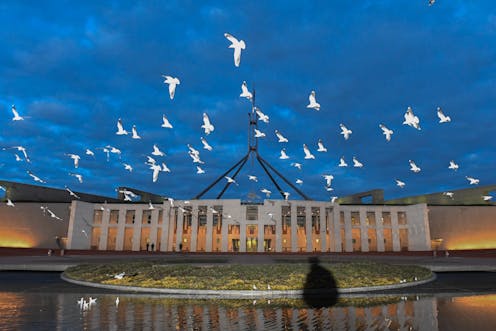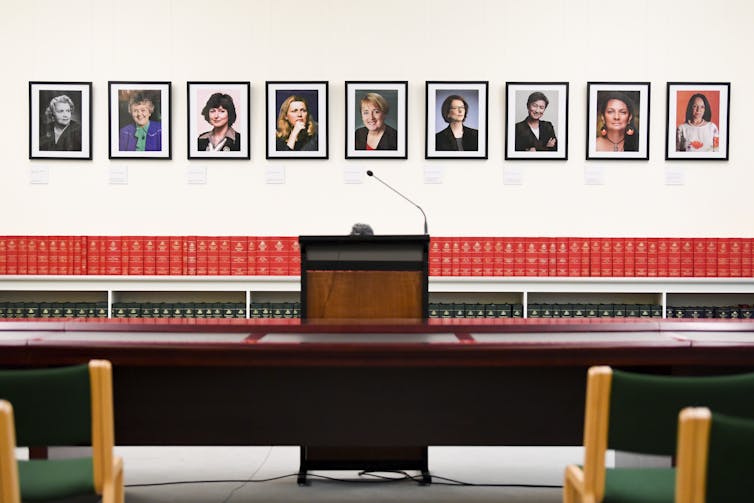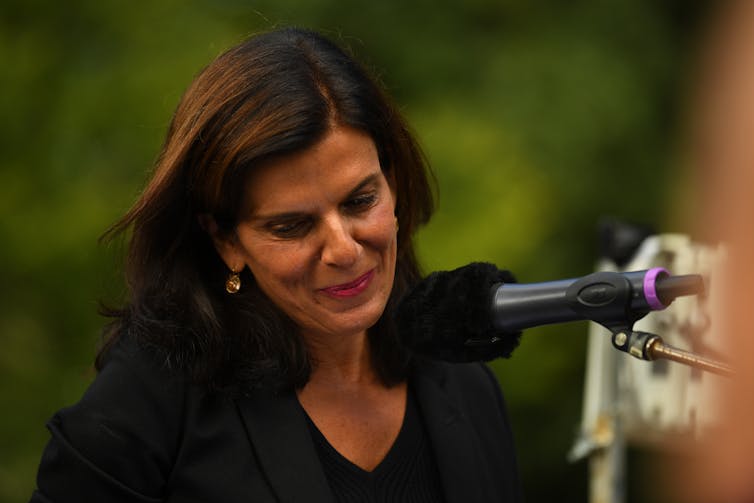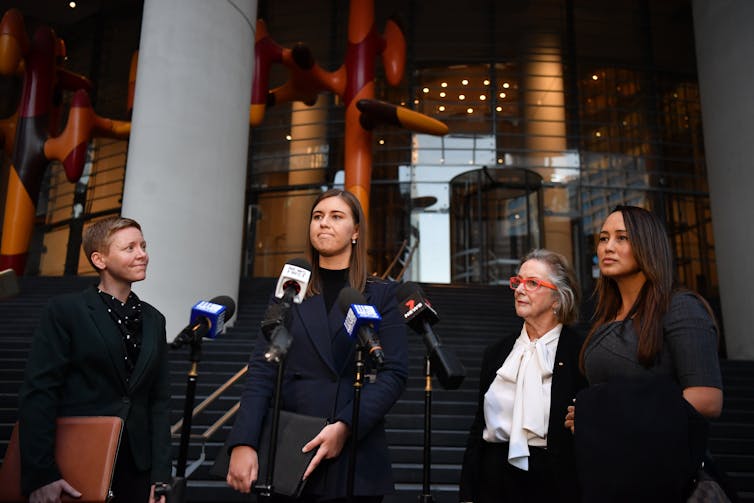Source: The Conversation (Au and NZ) – By Medha Majumdar, Fox International Fellow at Yale University; PhD Candidate at the Australian National University, Australian National University

Lukas Coch/AAP
We know Australian politics has a “woman problem” — the figures speak for themselves. Only 38% of all federal MPs are women, and there is a continued dearth of women in leadership positions.
We are also hearing increasing stories of the discrimination, sexism and outright abuse women face when forging a political career. Whether it be a junior political staffer or Australia’s first female prime minister.
Read more:
The missing women of Australian politics — research shows the toll of harassment, abuse and stalking
My research, done with the support of ALP-affiliated women’s organisation EMILY’s List Australia, examines the impact that violence against women in politics has had on the progress of women’s political leadership in Australia.
It investigates why it happens, how widespread it is and what the consequences are.
Speaking to women in politics
I conducted interviews with nine current and former MPs, election candidates, and volunteers and staffers from the ALP in 2021.

Lukas Coch/AAP
I also ran an anonymous survey open to women with experience at all levels of government: local, state and federal. Women across party lines participated in they survey. While the sample size of the survey is small (30), women wrote lengthy statements about their experiences.
My research charts women’s political careers from when they are girls interested in politics, to becoming volunteers and staffers, elections candidates, and finally members of parliament.
I found that at each stage, experiences of abuse and harassment force some women to abandon their aspirations for political leadership and at times, a political career entirely.
Harassment, bullying, assault
Many people start their formal political involvement as party volunteers or staffers. Violence and harassment were widespread among volunteers and employees of political organisations I surveyed.
-
83% of respondents said that they had been harassed, intimidated and verbally abused in the course of their work
-
77% reported being bullied
-
43% had been subjected to inappropriate sexual advances and behaviour
-
30% had been physically assaulted
The abuse mostly occurred within the workplace itself, or at a work-related event. In most cases, the identity of the perpetrator was known to the respondent. Unsurprisingly, 74% reported abuse and harassment had a negative impact on on their interest in continuing a career in politics.
As one respondent explained:
Verbal and physical harassment while working as a campaign volunteer gets very tiresome. After working on ten years of campaigns the negatives start to outweigh the positives. I have withdrawn from political participation as a result of constant online and real-life abuse.
What happens if you try to run for parliament?
If they were nominated as a candidate, some interviewees described facing threatening intimidation tactics from other members of their party to discourage them.
Read more:
‘Expect sexism’: a gender politics expert reads Julia Gillard’s Women and Leadership
This includes bullying behaviour, threats of isolation and back-listing within the party if they do not withdraw from the pre-selection process. Interviewees also described being “backgrounded” against or having rumours spread about them. This was particularly the case when they challenged favoured candidates or the fixed outcome of a pre-selection
As one interviewee explained:
When someone comes up out the blue, it threatens these predetermined outcomes. Because egos are on the line, and it has been done this way for a long time, people just use these intimidation tactics. They feel like they can justify that as politics. But it is very macho style of factional politics.
Candidates who are pre-selected go on to face abuse from members of the public and supporters of opposing candidates.
Expecting abuse in office from the public
If they survived this and were elected to public office, the threatening messages and abuse women MPs face from the public is relentless, particularly on social media.
In part, this abuse is the product of having a public profile. However, while male MPs also receive abuse, women are more often subjected to explicitly sexual and violent threats. In 2016, the Inter-Parliamentary Union (a global body of parliaments around the world) found this abuse is targeted at women MPs to discourage them from being vocal and politically active.
The women MPs interviewed said abuse is so normalised as to be expected in public office. Some reported having stalkers, as well as needing police patrols and close personal protection. More than one MP reported moving house because of the ongoing threat of violence.
You have to ensure that you are taking it seriously, particularly if the threats involve your office and staff. The threats are serious, because one day someone could lose their mind and try to kill you.
Harassed by other MPs
They also experience bullying and harassment from other MPs within parliament house.

James Ross/AAP
For women MPs, harassment takes the form of repeated intimidating behaviour and unwanted sexualised attention. Greens senator Sarah Hanson-Young is one federal MP who has spoken about this publicly. Recently, former Liberal MP Julia Banks described an unwanted sexual advance from a cabinet minister. Culturally and linguistically diverse women interviewed reported additional sexualised fetishism and attention.
As one interviewee described:
There were men who wolf-whistled, “Look at you, you look so good today”. I don’t take it just because I am a woman.
The missing women
Survey research already shows many young women think women MPs are treated unfairly by the media and male MPs. And that parliament house does not have a safe culture.

Dean Lewins/AAP
The poor reputation of politics discourages girls from choosing a career in politics in the first place. They are questioned by their friends and family about whether they will be safe working for a parliamentarian or political party.
One interviewee described her recent conversations:
I have actually had young women say to me, “I was so excited when I got offered a job as a staffer. [But] my parents said to me ‘Why would you go and work there? It is not safe.’”
Interview participants also expressed finding it difficult to encourage young women into a career in politics, knowing they could face abuse:
I find it really hard at the moment with what is going on with the Brittany Higgins story to be able to say those things I used to say. Which is, “it is a really honourable role to be a member of parliament. We need more really good female leaders. You should really consider stepping up. I would be happy to mentor you.”
So, the violence against and harassment of women in politics perpetuates itself to undermine the progress of women’s political leadership and representation in Australia.
My research suggest there are untold numbers of women who should have been in positions of political influence and leadership, but were put off.
They are the missing women of Australian politics.
How does this change?
My report makes 27 recommendations to reduce the prevalence of abuse and harassment against women in political organisations and politics more broadly. These include:
-
young women and girls must be targeted to become engaged in politics. They need to be shown that they already hold the personal qualities needed to be a political leader (i.e. they don’t need to fit a “macho mould”)
-
all political parties should make not engaging in intimidation, bullying and harassment a requirement of receiving party endorsement
-
political parties should review its pre-selection rules in order to promote transparency and competitiveness of contests, and reduce the ability of intimidation and bullying tactics to be used
-
safety guidelines for candidates in elections should be released by police forces and electoral commissions in Australia
-
political parties should provide online self-defence training to MPs and their staff to tackle online abuse.
My interviewees were also adamant there must be robust complaints mechanisms and support structures within political parties and the Australian parliament. It is noted the new 24 hour complaints mechanism that launched last week for MPs and staff has already been criticised by former Liberal staffer Brittany Higgins as inadequate.
Read more:
Politics with Michelle Grattan: Kate Jenkins on the women’s agenda
Ultimately, we must raise our demands and expectations of each other and our political leaders. Public office should be a place for people of the highest character and as citizens we should expect no less.
As a community we can no longer accept that enduring abuse and harassment is the cost of doing politics.
![]()
Medha Majumdar conducted this research as part of the Julia Gillard Next Generation Internship 2020-21 with EMILY’s List Australia. She is a member of the Australian Labor Party.
Medha receives funding from the Australian Government and the Westpac Scholars Trust to undertake her PhD research.
– ref. The missing women of Australian politics — research shows the toll of harassment, abuse and stalking – https://theconversation.com/the-missing-women-of-australian-politics-research-shows-the-toll-of-harassment-abuse-and-stalking-168567







